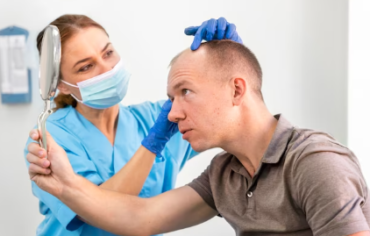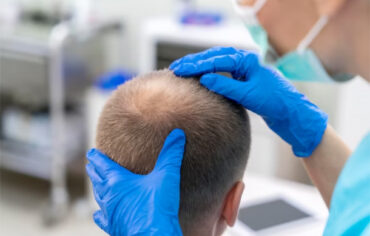NEED TO KNOW
Frequently Asked Questions
Alopecia is a medical term that refers to hair loss or baldness. It is a common condition that can affect both men and women of all ages. There are several types of alopecia, each with different causes and patterns of hair loss. Some of the most common types of alopecia include:
- Androgenetic Alopecia (Male/Female Pattern Baldness): This is the most common form of hair loss and is influenced by genetic and hormonal factors. In men, it typically leads to receding hairlines and bald spots on the crown of the head. In women, it often results in overall thinning of the hair.
- Alopecia Areata: This is an autoimmune condition where the immune system mistakenly attacks hair follicles, leading to sudden and patchy hair loss. It can affect the scalp or other parts of the body, such as eyebrows, eyelashes, and beard.
- Alopecia Totalis: A more severe form of alopecia areata where there is a complete loss of hair on the scalp.
- Alopecia Universalis: An even more extensive form of alopecia areata where there is a total loss of hair on the entire body, including the scalp, eyebrows, eyelashes, and body hair.
- Telogen Effluvium: This type of hair loss occurs when there is a sudden shift in the hair growth cycle, leading to increased shedding of hair. It can be triggered by various factors such as stress, illness, hormonal changes, or certain medications.
- Traction Alopecia: Caused by constant pulling or tension on the hair follicles, often due to tight hairstyles like braids, ponytails, or hair extensions. It is common among people who consistently wear such hairstyles.
- Scarring Alopecia (Cicatricial Alopecia): In this condition, inflammation destroys hair follicles, leading to permanent hair loss. The scalp may show signs of scarring or skin changes.
Treatment options for alopecia depend on the type and cause of hair loss. For some types of alopecia, hair growth may resume spontaneously without treatment, while others may require medical interventions, such as topical medications, oral medications, or in some cases, hair transplant surgery.
Hair loss or thinning can have various causes, and it’s essential to identify the underlying reason to determine the most appropriate course of action. Here are some common factors that can contribute to hair loss or thinning:
- Androgenetic Alopecia (Male/Female Pattern Baldness): This is the most common cause of hair loss, especially in men. It is primarily influenced by genetics and hormones (specifically the hormone dihydrotestosterone or DHT). In men, it typically leads to a receding hairline and baldness on the crown, while in women, it results in overall thinning of the hair.
- Alopecia Areata: An autoimmune condition where the immune system mistakenly attacks hair follicles, causing sudden and patchy hair loss. The exact cause of alopecia areata is not fully understood, but genetics and immune system dysfunction are thought to play a role.
- Telogen Effluvium: A temporary condition characterized by excessive shedding of hair due to a disruption in the hair growth cycle. It can be triggered by various factors, such as physical or emotional stress, illness, childbirth, significant weight loss, surgery, or certain medications.
- Hormonal Changes: Hormonal imbalances, such as those that occur during pregnancy, childbirth, menopause, or thyroid disorders, can lead to hair loss or thinning.
- Nutritional Deficiencies: Inadequate intake of essential nutrients like iron, zinc, biotin, and protein can impact hair health and lead to hair loss.
- Stress: Emotional and physical stress can cause hair loss, as it disrupts the normal hair growth cycle.
- Hairstyles and Hair Treatments: Excessive hairstyling, such as tight braids, ponytails, or hair extensions, can lead to a type of hair loss called traction alopecia. Additionally, the use of harsh hair treatments, like chemical relaxers and dyes, can damage the hair and cause breakage.
- Medical Conditions and Medications: Certain medical conditions, such as autoimmune diseases, scalp infections, and skin disorders, can cause hair loss. Furthermore, some medications, like chemotherapy drugs, may lead to temporary hair loss.
- Age: As people age, hair growth may slow down, and the hair may become thinner and more brittle.
If you are experiencing hair loss or thinning, it’s advisable to consult with a dermatologist or a healthcare professional. They can perform a thorough evaluation, take a medical history, and conduct any necessary tests to determine the underlying cause of your hair loss. Based on the diagnosis, they can recommend appropriate treatments including hair transplant surgery or lifestyle changes to address the issue.
The treatment for hair loss depends on the underlying cause and the type of hair loss you are experiencing. Here are some common treatments available for hair loss:
- Minoxidil (Rogaine): Minoxidil is a topical over-the-counter medication that is applied directly to the scalp. It is used to treat androgenetic alopecia (male and female pattern baldness) and can promote hair regrowth and slow down hair loss. It is available in various strengths for both men and women.
- Finasteride (Propecia): Finasteride is an oral medication available by prescription that is primarily used to treat male pattern baldness. It works by inhibiting the conversion of testosterone to dihydrotestosterone (DHT), which is a hormone that contributes to hair loss in genetically susceptible individuals.
- Low-Level Laser Therapy (LLLT): LLLT is a non-invasive treatment that uses low-level lasers or light-emitting diodes (LEDs) to stimulate hair growth. It can be administered at home with handheld devices or in clinics with larger devices.
- Platelet-Rich Plasma (PRP) Therapy: PRP therapy involves extracting a small amount of the patient’s blood, processing it to concentrate the platelets, and then injecting the platelet-rich plasma into the scalp. PRP is believed to promote hair growth by stimulating the hair follicles.
- Hair Transplant Surgery: Hair transplant surgery involves the transplantation of hair follicles from one part of the body (often the back of the scalp) to the areas affected by hair loss. It is a more invasive option but can provide natural-looking results.
- Medications for Underlying Conditions: If hair loss is due to an underlying medical condition, such as thyroid disorders or autoimmune diseases, treating the underlying condition may help to address the hair loss.
- Topical Corticosteroids: These medications can be prescribed to treat alopecia areata by reducing inflammation and suppressing the immune response attacking the hair follicles.
- Immunotherapy: For severe cases of alopecia areata, corticosteroids may be combined with a process called “topical immunotherapy,” where a chemical is applied to the scalp to trigger an allergic reaction. This reaction may stimulate hair regrowth.
- Nutritional Supplements: In cases of hair loss due to nutritional deficiencies, supplements containing vitamins (e.g., biotin, vitamin D), minerals (e.g., iron, zinc), and proteins may be beneficial.
It’s crucial to consult with a dermatologist or a healthcare professional to determine the cause of your hair loss and the most suitable treatment options for your specific situation. Not all treatments work for everyone, and individual responses to treatments may vary. Additionally, early intervention is often more effective in addressing hair loss, so seeking professional advice as soon as possible is recommended.
our benefits
The Significant Advantages
Here are some significant advantages of hair transplant:
Permanent Solution: Hair transplant provides a permanent solution to hair loss. The transplanted hair is resistant to the hormone that causes hair loss, ensuring long-lasting results.
Natural Appearance: Modern techniques, such as follicular unit transplantation (FUT) and follicular unit extraction (FUE), create natural-looking results. The transplanted hair blends seamlessly with your existing hair, making it difficult to distinguish from your natural hair.
blog feed
Hair Loss Articles

In general, a well-balanced and nutritious diet is essential for overall health, including hair health…

Losing hair at a young age can be distressing for many individuals. While genetics is the most common…

Your hair can provide valuable clues about your overall health and well-being…

